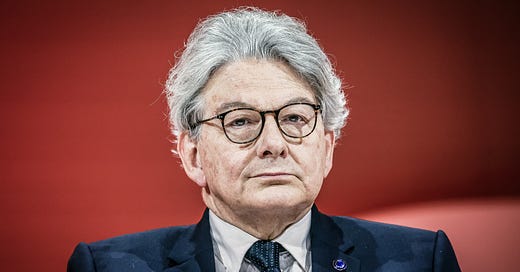Former Military Contractor Behind EU’s Radical Censorship Demands
Thierry Breton led cybersecurity firm whose subsidiary sold spying and censorship tools
In seeking sweeping censorship of much of the Internet, including major Big Tech platforms like Google, Facebook, and X, formerly Twitter, a spokesman for the European Commission yesterday insisted that it wants to “ensure a safe and fair online environment for European citizens that is respectful of their rights, in particular freedom of expression."
But according to X owner Elon Musk, the European Commission, the executive branch of the European Union, is trying to force X to hire hundreds of content moderators to censor speech. The Commission "offered 𝕏 an illegal secret deal,” said Musk, “if we quietly censored speech without telling anyone, they would not fine us.”
“The other platforms accepted that deal,” said Musk, “𝕏 did not.”
The European Commission’s spokesman said, "The DSA requires a fair and transparent complaint mechanism for users. If an account is suspended, the user has the right to contest the decision. This means that decisions must not be arbitrary, and users are empowered to protect their online presence... When an account is restricted, the user must be informed and has the right to appeal the decision."
But the spokesperson’s statement confirms Musk’s claim that the Commission is seeking to remove from X, Facebook, Google, and other Internet companies from the power to decide who and what is censored. As such, the EU is demanding mass government censorship.
The top person in charge of EU censorship is Thierry Breton, the EU’s “Internal market commissioner.” Since taking power, Breton has overseen a sweeping regulatory agenda covering military defense contracting, microchips, energy, and every other strategic industry, including social media and Internet companies.
Breton’s crackdown on free speech and exercise of control over content moderation at Google, Facebook, and other Big Tech companies came after he put down an effort by Google to resist the EU’s censorship demands in 2020.





